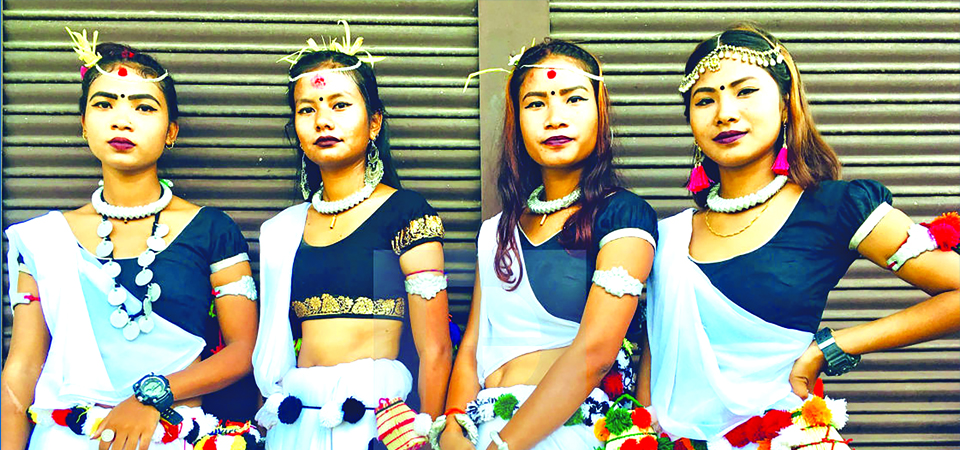Young Women Set An Example

Pallav Ranjan
A gorgeous young woman is sparkling in happiness: clad in a bright yellow sari, intricate local jewelry, complex mehndi patterns in the hot Terai flatland sun, in the village of Badebarshain in Saptari district.
The men of the village have been singing and dancing in her praise for 10 days and nights. The women began singing and dancing five days ago. Her father croons in a crackling voice: “You are my whole heart, who is this new man coming into your life? Will he treat you right?”
Dancing to the rhythm of drums, wailing winds, and twanging strings: they celebrate the person she is, they praise her father and her good family, and speak of a bright new life that awaits her. The women are lamenting, “Will the groom pamper this amazing girl, our own princess? Will she smile forever?”
But beyond this lovely memorable day, the reality that awaits may be quite different and gaspingly, shockingly cold. In some homes there is work, early morning to night with women (particularly the mother-in-law and sisters-in-law) waiting to stamp their authority on her and abusive men. Some homes are looking forward to the dowry and financial rewards from her parents for taking her into their homes (where is the land that was promised? They will ask of her, the motorbike, the money to add one more storeys to the house so you can live in comfort, where are the funds that will pay off the family debt?).
She is already behind in her studies – girls go to school later in life in this area, so at 16, she is in grade 6, four years behind the national normal – it is the very rare family that will encourage her to study further. She will have no control over family money or her husband’s income, elders take full control of financial matters. Her husband and she will have little time to themselves so quality conversations that explore wishes, ambitions, and plans will be at a premium.
With the passing of months and year, if she is not expecting a child, or unable to deliver a male heir, questions will be asked, significant pressure will build: maybe her husband needs to marry someone else! If she delivers a daughter, or two, things may well become intolerable. A son means he will bring home a daughter-in-law who will bring riches, a daughter means the son-in-law will have to be paid a princely dowry (illegal by law, but still practiced).
Our princess, our beautiful Cinderella, may well have cinders and dung and hard work and hurtful words to keep her company for many years of her life.
But wait, in the village of Badebarshain, there are other young brides who have a “different” idea. In this village, mostly lived in by the Dalit, Muslim, and the marginalised, 80 recent brides are waiting for her, to take her under their wing. They have been learning, honing their potential, breaking the cycle of dependency, with the help of counselors from VSO (Volunteer Services Overseas) and many are running their own business whether it be as tailors, grocery shop owners, tea hut wallis, or small farmers with goats, cow or buffalo.
They know of this new marriage and realisation and comradery has made them powerful. The 80 young bride network, has trained with the local municipality and Strengthening Access to Holistic, Gender Responsive, and Accountable Justice (SAHAJ).
They have access to friendships, phone lines and counselors, they can turn to people for help within and without their own family. Their fathers in law, mothers in law, husbands and other member of the family have been with them in discussions on gender rights, marriage solutions, income generation, education, and right to self-determination.
Because of strength in numbers, they are always seeking to add to their numbers so when the marriage takes place and the young woman is in her new home, she is visited by other brides in the neighborhood. The family gets linked to the counselors and trainers who bring everyone together, the bride, the groom, the elders, and middle aged and the young in the family and everyone gets to say their say, everyone gets to view this world from someone else’s perspective.
Building tolerance, creating sustainable cooperation, working and improving together is not an easy task where centuries of established tradition have to be tweaked. But when others who have been through the experience take the trouble to hold hands, explain kindness, working family relationships, entertainment, respect, learning, and earning for independence and contribution to the family, messages are easier understood.
Our princess may not live a fairytale, but her life will improve, she will be at less of a risk, she will be better understood and find greater happiness as she communicates more, shares her feelings, learns how to improve her livelihood, gain new skills, and try and make an income.
(Pallav Ranjan of the Spiny Babbler Knowledge Center is author of several books.)
Recent News

Do not make expressions casting dout on election: EC
14 Apr, 2022
CM Bhatta says may New Year 2079 BS inspire positive thinking
14 Apr, 2022
Three new cases, 44 recoveries in 24 hours
14 Apr, 2022
689 climbers of 84 teams so far acquire permits for climbing various peaks this spring season
14 Apr, 2022
How the rising cost of living crisis is impacting Nepal
14 Apr, 2022
US military confirms an interstellar meteor collided with Earth
14 Apr, 2022
Valneva Covid vaccine approved for use in UK
14 Apr, 2022
Chair Prachanda highlights need of unity among Maoist, Communist forces
14 Apr, 2022
Ranbir Kapoor and Alia Bhatt: Bollywood toasts star couple on wedding
14 Apr, 2022
President Bhandari confers decorations (Photo Feature)
14 Apr, 2022










